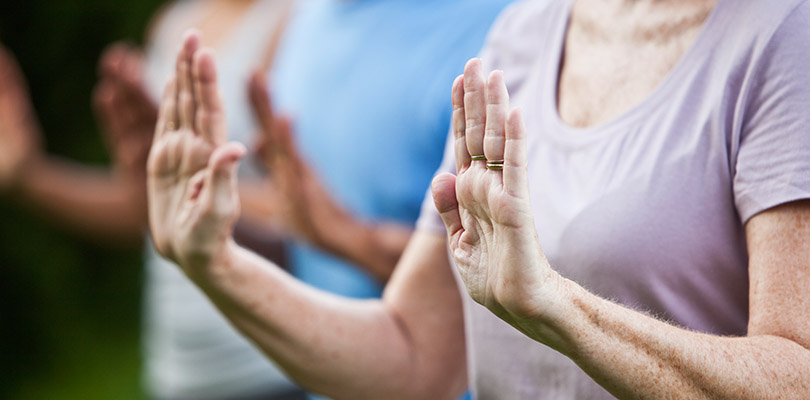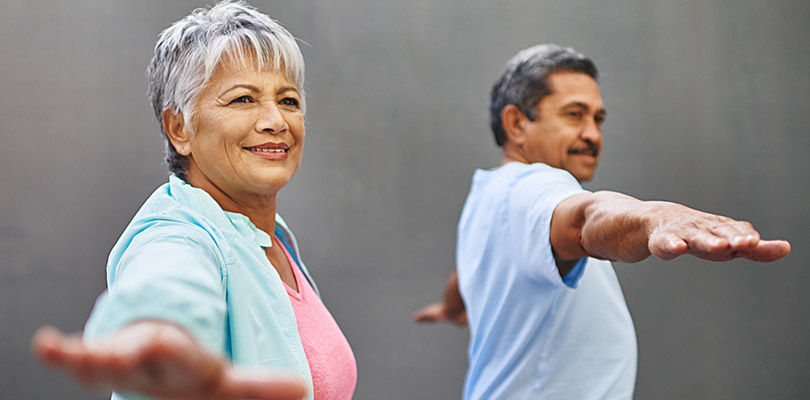
Exercises for Arthritis
Don’t let arthritis get in the way of your fitness goals.
If you don’t think you can exercise with arthritis, you need to adjust your mindset. Exercising helps relieve pain as well as provides a boost of endorphins. You merely need to be mindful of your body so you can work out safely with the arthritic barriers of pain, stiffness, and fatigue.
Before you grab your gym bag, take care of yourself and practice some due diligence. See your doctor to determine which exercises will be the most beneficial to you. Some exercises and movements should be avoided or included in your fitness regimen to maintain optimal health.
There are a few things to consider when you embark on your active journey:
- Keep your limitations in mind.
- Stay consistent with your routine and try to be active every day; this will strengthen your muscles which help control the pain and swelling in your joints.
- Always warm up properly; during exercise, your body will move with greater ease and decrease your risk of injury.
The best exercises for arthritis will be in flexibility and range of motion, strengthening, and aerobic or endurance exercises. The breakdown below shows the top eight exercises which can be modified for people with arthritis.
1. Tai Chi
This ancient Chinese martial art form is one of the best workouts you can do with arthritis. With gentle and deliberate movements strengthening your muscles and improving balance, this regimen checks all the boxes.
Tai chi helps protect joints, and better balance prevents falls. The meditative flow of movement improves your circulation and helps release pain as well as reduces stress. You can move at your own pace and, since there isn’t any equipment needed, you can do it anywhere.

2. Yoga
Yoga focuses on mindfulness and self-care. Stretching should be done daily, and yoga is a great way to ensure you’re stretching with proper body alignment.
Breathing, balance, and meditation center you while you build strength. Yoga can be modified to work with every type of body and fitness level; make your instructor aware of your pain points and they can show you modifications. Be mindful of your muscles and don’t push yourself into poses that are uncomfortable.

3. Pilates
Pilates is like yoga – it utilizes the breath and focuses on body alignment. This type of exercise focuses on stretching and strengthing the body while improving balance with unstable postures.
This workout is challenging and should only be performed under the supervision of a trained expert.
All challenges have their rewards; This exercise reduces weight, helps prevent further arthritis, and improves flexibility, physical, and mental health. It reduces chronic pain, enhances lubrication of the joints to improve function, and prevents wear and tear of the joints.

4. Free Weights
Put on a motivating playlist and hit the gym. Free weights are the go-to exercise when it comes to building strength. Weight and resistance exercises help your body develop shock-absorbing abilities which protect your joints and ward off more pain and injuries.
Mix up your arm and leg exercises to avoid early fatigue, keep the weight light, and ensure your movements are smooth and controlled. Quick tip: don’t grip the weights too tightly; it adds undue pressure to the joints in your hands and fingers.
If you suffer from pain, tingling, and numbness in your hand and arm, you may be experiencing the early symptoms of carpal tunnel syndrome.

5. Swimming
This exercise is great resistance training even if you don’t have arthritis. The low impact nature of the sport will work all of your muscle groups while building on your cardio. Benefits include strengthened muscles, lack of impact on your joints, full body stretch, and meditative effects.
Kickboards and other swim equipment are available if you need to modify your strokes, and lessons are available if you need to learn better technique to lessen joint strain. Since pools are usually colder, definitely make sure you do a complete warm-up before jumping in the water.

6. Water Aerobics
There is more resistance to be found in the water than on land; if you’re working out in a pool, you’re expending greater effort and burning more calories. Working out in water is a great benefit if you’re just starting a fitness regimen or your fitness level is low.
The buoyancy relieves pressure on your joints, and your workout isn’t constrained by body weight. The perks of these classes are increased cardio, better range of motion and aids in improving balance. Most aquatic centers will offer a water aerobics program targeted to people with arthritis.

7. Stationary Biking
You can still peddle for miles on end with this cardio favorite. Pick a stationary bike that suits your needs; recumbent bikes have the pedals in front they don’t rely on using the wrists or hands on the handlebars (as you would with a spin bike).
Indoor cycling is good for your heart, hips, and knees and has little impact on the weight-bearing joints. With only a few quick setting adjustments, the bike can be customized to fit you. Over time you can increase your speed and resistance level.

8. Walking
Walking is a step in the direction of improving your arthritis symptoms. It lessens the strain on your joints by reducing both stiffness and inflammation. Walking keeps your heart healthy and your bones strong. Losing weight is a bonus. If you want to challenge yourself, get a step counter and set daily goals. Remember to wear appropriate footwear and walk on flat, level surfaces. Avoid turning your walk into a run; the impact of running is not good for your joints.
After your workout, remember to cool down. If you experience pain during your exercise, don’t work through it; not all exercises are ideal for everyone. Your priority is to work out in a way that doesn’t provoke joint pain.
You can still meet your fitness goals with arthritis. You may have to modify your routine with some of the suggestions above. Be mindful of your limitations, and you will set yourself up for a successful fitness regimen.
Following an arthritis diet plentiful in fruits, vegetables, fish, beans, and nuts are good for your body and reducing pain overall.








